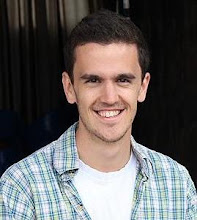April 2012
Today I met Chatty for
the very first time, and Godfrey for the second. Both of them four years old,
both of them stripped too soon of the love and care and security of their
parents, and both of them possessors of arrestingly disarming smiles, if not only
because they are so rare a thing. It struck me as surreal to see these children
face to face, to hold them as closely as I did, after knowing their stories so
intimately and for so long. Since April of last year, when a team from our
church in the UK returned from a short trip to Zambia having spent time in this
community we support, Chatty and Godfrey have been spoken of much. The impact
they made upon our team, Chatty upon my own Dad in particular, reached beyond
the hearts of only those who met them in the flesh; upon the heart of a church
and a family that miles and culture keep far distant from this place. Back then
these two young men, both of them wounded in heart and memory, allowed not a
corner of their lips the faintest flicker of a
smile. But today I saw different children than those of whom I’d heard so much.
Welcoming. Loving. Even happy. How fairer the countenance swept with a smile. I
started thinking about the way we lay foundations in the lives of others. We
first entered this little rural community, obscured deep in the Zambian bush,
in 2010 to meet a crowd of children too afraid to approach us except to see the
magic of bubbles blown from a little tub of soapy water. Now it’s difficult to
walk for fear of trampling on children so happy and so proud to hold us as
friends. And this time, Godfrey can be loved in his joy and in his healing,
because once upon a time someone else loved him in his pain and poverty.
Chatty, this misnamed child as my Dad
called him a year before, can know something of safety and security in the presence
of strangers such as us because he remembers a stranger who once upon a time
walked into his home, and exited it all the same, only leaving behind him the
faint aroma of deep and lasting love that can pierce the stench of loneliness,
despair and death. We like to think of ourselves as independent and autonomous
creatures, only affected by others in as much as we allow ourselves the
vulnerability to be affected. I remember sitting in a pub in England listening
to the fiery exchange between one woman and a much younger girl, apparently her
granddaughter, who was bombarding the older lady with verbal and emotional
abuse. Her reply to all of this was something about having very thick skin and
not letting insults affect her, particularly from a snotty little brat who should
know better. But I thought: what must have affected her in the past, and to
what extent, that she would now not allow herself to be hurt by the sting of a
well aimed insult, even from a voice as precious as that of her own
granddaughter? And I realised, no matter how independent we like to think
ourselves, no matter how we may like to believe that we live in a vacuum, only
being affected by that which we allow close enough to affect us, the truth of
the matter is: we are all of us architects of one another.
One lays the
foundation, and another builds upon it. A mother speaks a cruel word to her
little girl and the foundation is laid for a lifetime of cynicism and mistrust.
Another child loses a father to alcohol and a chasm is ripped in that boy’s
heart that no closeness or intimacy will ever be permitted to bridge. They stay
with us like a foul taste stuck in the mouth, these bitter memories. But
another child, with every reason to give up on life and the world and whichever
god had the insanity to make that world and then the audacity to call it
‘good’, against all odds grows up into a happy and healthy child. Why? Because
where once he knew only hurt and pain someone loved him into healing, and upon
a broken and bent foundation something beautiful was raised. We have the
choice, all of us, as to whether we let our past determine our future or allow
our future to redeem the past. No pain is beyond redemption. Someone once said
that every child comes with the message that God has not yet given up on the
world. That must be followed shortly by the message that no child is born to be
given up on. If only we could see how much of the healing power of God himself
was embedded in our DNA when he gave us the capacity to love one another. Then
the quiet word, the passing smile, the tear lent to someone who has used up all
their own would never be underestimated in its might to heal. All of us are in
either the business of construction or demolition, building trust, hope and
love into the lives of those around us or tearing it down. In Godfrey, in that
misnamed child Chatty too, people are continuing to build from a broken and a
bent foundation something truly beautiful. And few things are as beautiful, few
things at once so simple and yet so profound, as a face once etched with pain
now swept with a smile.


